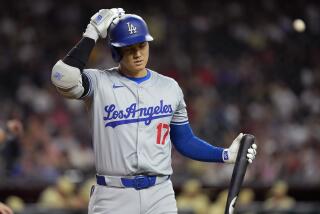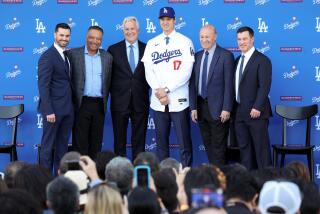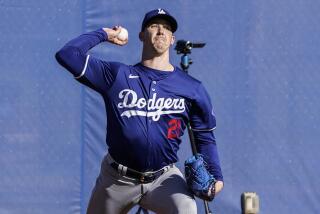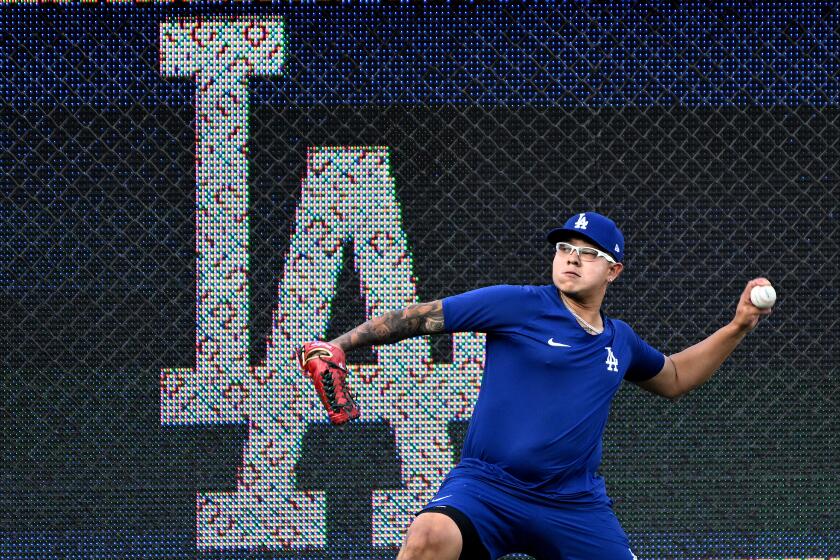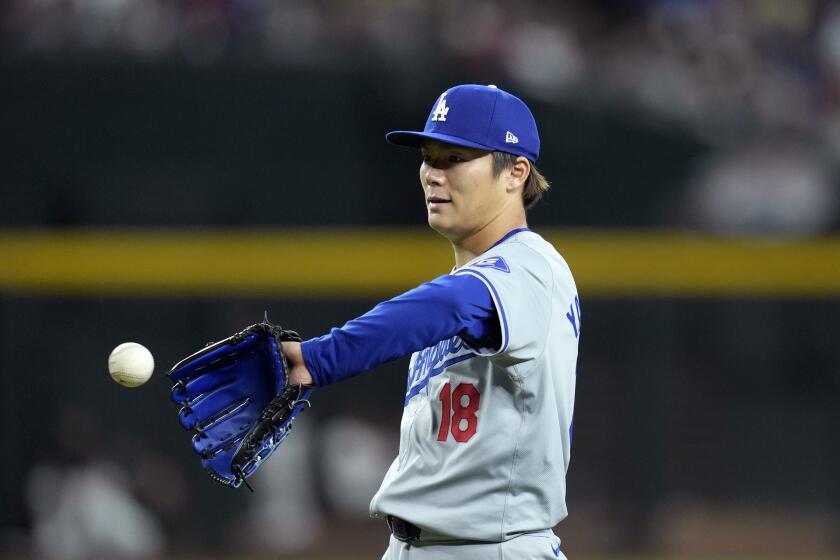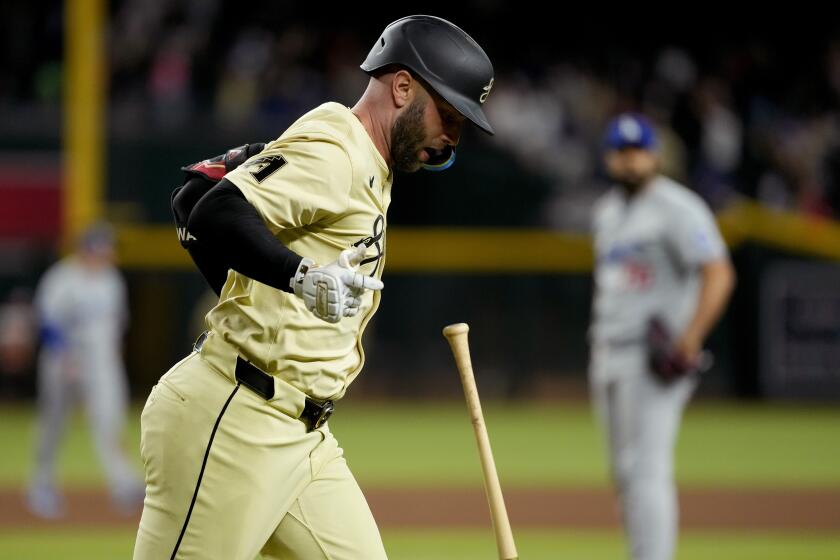Relaxation Leaves Fernandez Ill at Ease
Merv Rettenmund, the Padres’ batting instructor and therefore a genius, was talking about Tony Fernandez, at .336 an obvious star pupil.
Though Fernandez looks unorthodox with his stiff front leg and bat cocked exaggeratedly back, Rettenmund was running through all the checkpoints and how Fernandez gets from where he starts to where he is supposed to be.
Down low. Bat back. Strong hands. Good follow-through.
Consistent.
“One more thing,” Rettenmund said as I walked away from the lesson. “Tony works too much.”
Huh?
Works too much?
Octavio Antonio Fernandez is a picture of calm on a baseball field. He plays shortstop as smoothly as Kristi Yamiguchi skates. His swing is seemingly effortless. He looks like he could play the game in his sleep.
Fernandez, as it turns out, works hard to make it look easy.
“To be good, you have to consistently work at your game,” said Fred McGriff, Fernandez’s teammate both in Toronto and with the Padres. “He doesn’t make great plays in the game just by showing up. To hit, you have to constantly hit and hit. He just wants to be the best shortstop around.”
Tony Fernandez just might be the best shortstop around. There are not that many great ones, and Fernandez is definitely a great one.
Joe McIlvaine, in one of his first moves as the Padres’ general manager, acquired Fernandez in what was one of the most daring trades of recent years. It was Dec. 5, 1990 when McIlvaine traded Robbie Alomar and Joe Carter to the Blue Jays for Fernandez and McGriff.
The tendency was to break that down into two different trades, Alomar for Fernandez and Carter for McGriff. Both teams are doing so well on both ends that all four players probably will be here in the All-Star Game. McIlvaine’s thinking was that it was more difficult to find a multi-talented shortstop than a similar second baseman, and it’s hard to fault that thinking.
The Padres have never had the play at shortstop they have gotten from Fernandez, both offensively and defensively. Ozzie Smith was with them too early in his career, before he picked up his offense, and Garry Templeton was with them too late in his career, after bad knees had limited his range and inhibited his hitting.
Tony Fernandez, at 29, is in his prime.
Now it’s just a matter of not working so hard, regardless of how incongruous an idea that might seem to be.
“He was doing so much before the game,” Rettenmund said, “by game time he was tired.”
He’s a perfectionist, huh?
“You can’t fault him for that,” Rettenmund said. “He’s a worker.”
Fernandez has listened.
“Some people,” he said, “have lazy habits. Some people are workaholics who work too much. One or the other is bad. You have to keep it balanced.”
This is a new approach for him. The notion of taking anything easy--or at least easier--didn’t mesh with his work ethic. It was a matter of improving, for sure, but also a matter of constantly having to battle back from injuries.
“Because of all the injuries in my past,” he said, “I feel like I have to work a little bit extra. I have to work harder than the other guys to keep up with them. Now it’s something where they’re telling me I work too much. I just have to cut down on my work habits.”
You hear about these injuries--hand, knee, elbow, cheek, leg and thumb--and you figure his career would be dotted with 90-, 100- and 110-game seasons. No way. Since his first full major league season, 1985, Fernandez has never played in fewer than 140 games. He played 145 games for the Padres last year and hit .272 in spite of a midseason thumb injury that required postseason surgery.
Fernandez thought that weight work would cut down on some of these nuisance injuries. He has done some rethinking on that thought.
“I thought working would compensate,” he said, “but that’s not the case. You can do some damage to yourself by over-working. You need to know when to stop. You need to know how far you can go before you burn up.”
Fernandez really started this more relaxed approach during the off-season. Most of his winters had been dedicated to his summers. That meant he didn’t really have off-seasons.
“This one,” he said, “was my best. I decided to spend time with God and my family. I got away from baseball and rested my mind and my body. I had made baseball my god. I worked too hard and worried too much. I had to keep things in perspective and know my priorities.”
What the Padres have on their hands is a refreshed and fresher Tony Fernandez. He is stronger in May because of his off-season and he should be stronger in August and September because he is working hard at not working as hard in May.
Whatever works.
More to Read
Are you a true-blue fan?
Get our Dodgers Dugout newsletter for insights, news and much more.
You may occasionally receive promotional content from the Los Angeles Times.
